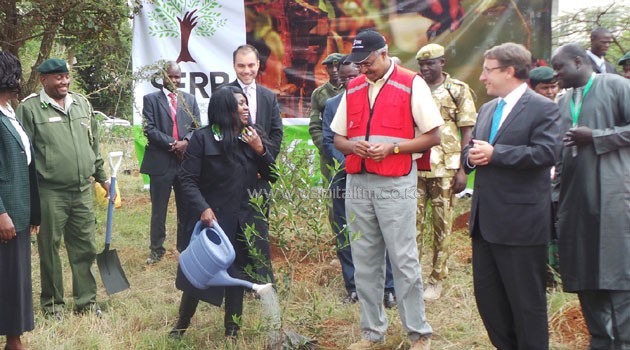
The program is set to increase the country’s forest cover which is below the global conventional level of six percent to 12 or 16 percent in the next five years/FILE
The program is set to increase the country’s forest cover which is below the global conventional level of six percent to 12 or 16 percent in the next five years.
Environment, Water and Natural Resources Cabinet Secretary Judi Wakhungu says that the environment is the foundation of any development and through this initiative the ecosystem restoration will be enhanced.
“The government’s commitment is to restore our environment especially our water catchment areas and also our water towers. What we have tried to do is to partner with a number of organisations, we are very good at making the policy but we do struggle sometimes at implementing so therefore the innovative partnership with Red Cross will allow us to be more effective on the ground,” she said.
Speaking during a tree planting ceremony at the Nairobi National Park, Kenya Red Cross Society Secretary General, Abbas Gullet confirmed that 2,350 volunteer youths have already been trained to establish and mange tree nurseries.
“First of all, we will start with our own staff and volunteers of branches of Red Cross and communities. We will involve the rest of Kenyans in this because it’s a Kenyan challenge and a Kenyan solution that we must find. We are going to complement the efforts of the government, every one year we plant 500 million trees, so we are going to use ordinary Kenyans to do extra-ordinary things.”
“We are going to work with the ministry to lay out a bigger strategy on how each and every individual Kenyan can play a role in this. We want to start with schools, colleges, communities, the private sector; we need to work in all towns with county governments. We would say wherever you are you can plant a tree. We want to systematically start working deliverables every month to announce how many trees have been planted. In one year we give accountability on achievements and say if we are on track or not,” he confirmed.
United Nations Environment Programme, Executive Director, Achim Steiner says that conservation and management of the environment and its natural resources through sustainable exploitation will restore the socio-economic development.
“This is a practical expression on how you build a green economy that will benefit people in the rural areas and the cities that would make Kenya richer rather than poor if one does not rebuild or restore some of these natural resources,” he said.
“Planting trees is something everyone can do but it also needs to be done on a scale and I think through this today we are celebrating Kenya taking a very bold step into the future of having its forest cover restored.”
Kenya’s transition to a green economy could produce major economic benefits according to a new study launched Tuesday by the Government of Kenya and the United Nations Environment Programme.
Wakhungu says the government has implemented policies to move towards a green economy, and this approach is recognised in the country’s long-term development plan.
“Kenya is actually very green when it comes to energy; we are about 65 percent renewable so we are expanding our geothermal energy so that we can achieve 5000 megawatts.
“When it comes to fossil fuels we are being very careful by expanding on fossil fuels and also on coal and I think in the long run we will actually end up been 70 percent green energy.”
Steiner emphasised that through the transition to a green economy it will result to a stronger economic growth and increased wealth creation opportunities by the year 2021.
“If you are not thinking about energy efficient power you’re just going to pay bigger bills long into the future. We will be earning a lot of money in a few years time when we have paid off our installation; we will be producing electricity for free and we will be able to sell it.”
“That is the future of renewable energy in Kenya and I think it’s embedded in the larger approach that Kenya has taken towards green energy and may continue to do so because it has become a leader in the world today,” he says.









































